
Our current daily activities bear little resemblance to the routines as of as recently as a month ago. COVID-19 has had an obvious and significant impact on the American people. For those suffering from chronic conditions such as dementia, diabetes, heart and respiratory disease, the health impact during traumatic periods such as this is magnified.
The COVID-19 pandemic has disrupted our lives and has caused unprecedented harm to the economy, most certainly including the national start-up community. Many startup companies will fail due to an inability to progress with their plans and raise the capital needed to survive during these difficult times. VIC’s portfolio of companies are not immune from the challenges caused by the pandemic. However, having the support of VIC (and the lower fixed cost burn rates that being part of VIC allows for), positions our companies much better than most.
Importantly, several of VIC’s portfolio companies, as well as new technologies in our pipeline, have an opportunity to play a direct role in response to pandemics and potentially mitigate the current crisis or even prevent future ones. For example (A-Z), BlueInGreen—a water cleantech company based in Fayetteville, Arkansas—has steadily made a name for itself by providing award-winning solutions to a wide variety of clients in the biological, municipal and ecological treatment space. The Company’s highly efficient method for dissolving oxygen, carbon dioxide and ozone into water has saved end-users millions of dollars in water usage, chemical costs and energy consumption. Now, in the face of the current pandemic, BlueInGreen is working to save lives as well.
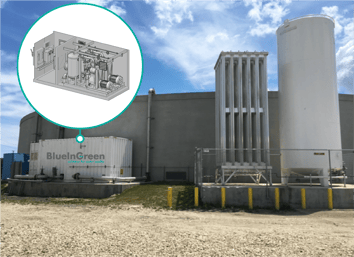 As a result of the global SARS-CoV-2 outbreak, huge viral loads are present in the municipal wastewater of an infected population, and data support the notion that the virus is viable in the environment for prolonged periods under some conditions. This facilitates environmental contamination and potential transmission from direct exposure to untreated waste, including the inhalation of aerosols.
As a result of the global SARS-CoV-2 outbreak, huge viral loads are present in the municipal wastewater of an infected population, and data support the notion that the virus is viable in the environment for prolonged periods under some conditions. This facilitates environmental contamination and potential transmission from direct exposure to untreated waste, including the inhalation of aerosols.
Featuring a 98%+ gas-transfer efficiency rate, BlueInGreen’s SDOX® technology uses a pressurized approach to rapidly and efficiently dissolve oxygen in a closed, side-stream process. Unlike conventional treatment methods that promote aerosol formation in open environments—such as jet and surface aerators placed directly within treatment basins—the SDOX® super-saturates the water with oxygen in a closed, pressurized vessel at the molecular level in the side-stream before returning it to the bulk flow, preventing the production of bubbles or aerosols. Even in non-pandemic situations, it creates a much healthier environment for WWT workers. “We are in this together,” said Chris Milligan, President, CEO and Chief Engineer at BlueInGreen. “Like so many others operating within essential industries, our team at BlueInGreen is working to provide solutions that limit the spread of the virus and improve the working conditions for, and the health and welfare of, essential workers.”
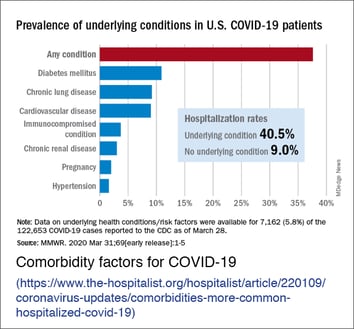 CardioWise's non-invasive Cardiac Computed Tomography (cCT) analysis software, called SQuEEZTM, is uniquely capable of identifying those patients with heart function injury, one of the top comorbidity factors for COVID-19. Also, COVID-19 can itself cause severe heart damage due to myocardial inflammation.
CardioWise's non-invasive Cardiac Computed Tomography (cCT) analysis software, called SQuEEZTM, is uniquely capable of identifying those patients with heart function injury, one of the top comorbidity factors for COVID-19. Also, COVID-19 can itself cause severe heart damage due to myocardial inflammation.
CardioWise’s SQuEEZ can help doctors quickly and accurately identify those patients who have the highest risk and thereby save lives. Since many patients are already getting a chest CT to diagnose their lung involvement, with a few more seconds in the scanner, CardioWise can diagnose their heart health as well and play a vital role in the COVID-19 pandemic response. Because SQuEEZ provides quantitative results, not just qualitative results, it can be used to monitor disease progression and treatment effectiveness.
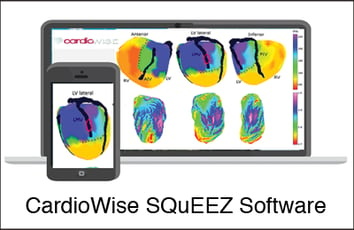 Based on recent evidence released by the World Health Organization, American College of Cardiology, and others, COVID-19 patients with heart disease die at 5 times the rate of the average patient. That is the highest death rate for all at-risk categories of COVID-19 patients.
Based on recent evidence released by the World Health Organization, American College of Cardiology, and others, COVID-19 patients with heart disease die at 5 times the rate of the average patient. That is the highest death rate for all at-risk categories of COVID-19 patients.
CardioWise SQuEEZ software produces a quantitative evaluation of the heart system using the data from a cardiac CT scan. This analysis is graphically presented in easy-to-interpret, three-dimensional color contour maps that indicate the areas of the heart that work normally and those that are damaged. CardioWise SQuEEZ analysis can pinpoint the location and extent of heart injury and assist doctors in determining the course of action to treat the patient.

CardioWise will be seeking expedited FDA approval for its software to be available for COVID-19 cases. Prior to FDA 510(k) approval by the FDA, CardioWise technology may be used by hospitals under an Internal Review Board (IRB).
Another VIC portfolio company with an important technology relevant to viruses impacting the respiratory system is Nob Hill Therapeutics (NHT). Cases of COVID-19 frequently have led to deadly secondary infections like pneumonia. In severe cases, gas exchange may be inhibited by inflammatory fluid causing patients to require ventilation to oxygenate their blood. NHT is developing a dry powder nebulizer technology (DryNebTM) that has the ability to treat pneumonia-causing viral infections like COVID-19.
DryNeb has the capacity to work in both asymptomatic and very sick patients with compromised lung function or those on ventilators, regardless of age. Specifically, the DryNeb inhaler platform has the unique capability to deliver high dose therapeutic drugs in a potent/pure form directly to the lower airway and alveoli regardless of a patient's lung capacity. Such direct delivery not only enables fast therapeutic action, but also minimizes systemic side effects.
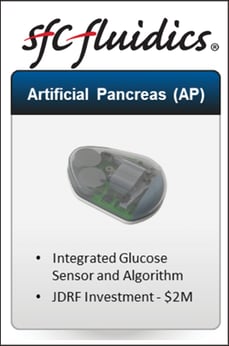 SFC Fluidics is developing a single-pod artificial pancreas that can reduce the risks associated with COVID-19 and future pandemics for patients with diabetes. According to a recent report by the Centers for Disease Control and Prevention, more than 50% of people with diabetes who have been diagnosed with COVID-19 are hospitalized. People with diabetes and associated poor glycemic control have a significantly weakened immune defense and are more adversely affected by viral infections. Hospitalized diabetic patients face longer hospitalization and recovery times. Tighter glycemic control can be achieved by more frequent monitoring of glucose level and the subsequent insulin injection. The current standard of care is four to five blood glucose measurements with the same number of insulin injections throughout the day. SFC’s single-pod artificial pancreas will perform the glucose measurement and administer an insulin micro-bolus every six minutes. More frequent testing and dosing will result in much better patient health. Further, the patient testing and insulin dosing data are automatically recorded and available electronically to allow for remote patient monitoring by family members or healthcare providers.
SFC Fluidics is developing a single-pod artificial pancreas that can reduce the risks associated with COVID-19 and future pandemics for patients with diabetes. According to a recent report by the Centers for Disease Control and Prevention, more than 50% of people with diabetes who have been diagnosed with COVID-19 are hospitalized. People with diabetes and associated poor glycemic control have a significantly weakened immune defense and are more adversely affected by viral infections. Hospitalized diabetic patients face longer hospitalization and recovery times. Tighter glycemic control can be achieved by more frequent monitoring of glucose level and the subsequent insulin injection. The current standard of care is four to five blood glucose measurements with the same number of insulin injections throughout the day. SFC’s single-pod artificial pancreas will perform the glucose measurement and administer an insulin micro-bolus every six minutes. More frequent testing and dosing will result in much better patient health. Further, the patient testing and insulin dosing data are automatically recorded and available electronically to allow for remote patient monitoring by family members or healthcare providers.
SFC’s drug delivery pod, while being designed for diabetes, can be extended to other conditions such as chronic pain and cancer treatment. Patients who suffer from chronic illnesses may have difficulty following treatment regimens during times of upheaval such as the current COVID-19 crisis. SFC is enabling automation of healthcare and remote professional monitoring into its product for better patient care during the times of major upheaval.
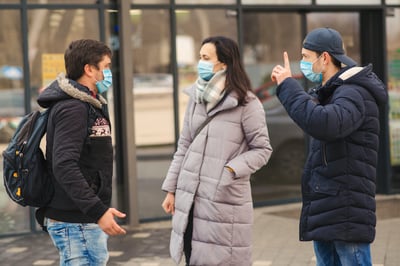 Zebra Analytix is addressing the lack of rapid, point-of-care evaluation of patients suffering from diseases caused by pathogens—particularly viruses—a critical shortcoming of the global epidemiology and healthcare continuum made clear by the current SARS-CoV-2 pandemic. The company will apply its miniaturized, analytical technology to the detection of breath-based markers of COVID-19 disease as a mechanism for pre-screening patients within minutes and triaging medical care accordingly. Most importantly, this approach does not require the development of specific reagents (primers, antibodies, etc.), and instead relies on the pattern of volatile organic compounds (VOCs) found in the patient’s exhalation to provide immediate assessment, and thereby, extends its utility to future infectious disease outbreaks.
Zebra Analytix is addressing the lack of rapid, point-of-care evaluation of patients suffering from diseases caused by pathogens—particularly viruses—a critical shortcoming of the global epidemiology and healthcare continuum made clear by the current SARS-CoV-2 pandemic. The company will apply its miniaturized, analytical technology to the detection of breath-based markers of COVID-19 disease as a mechanism for pre-screening patients within minutes and triaging medical care accordingly. Most importantly, this approach does not require the development of specific reagents (primers, antibodies, etc.), and instead relies on the pattern of volatile organic compounds (VOCs) found in the patient’s exhalation to provide immediate assessment, and thereby, extends its utility to future infectious disease outbreaks.
VOC biomarkers have been used to diagnose and/or manage multiple respiratory diseases such as asthma, COPD, cystic fibrosis, tuberculosis, and ventilator-assisted pneumonia. Unfortunately, the gold standard method of detection, gas chromatography/mass spectrometry (GC/MS), is a large, lab-based technology requiring highly trained technical staff to process samples, making them unsuitable for point-of-care applications by non-technical personnel.
The Zebra Analytix technology is based on innovation licensed from Virginia Tech, and employs MEMS (microelectromechanical systems) manufacturing to create miniaturized components such as preconcentrators, separation columns, and detectors, which—when combined—result in a hand-held, simple-to-use, analytical system based on the principles of gas chromatography (GC). In previous work, Zebra Analytix has developed and optimized the approach to measure VOCs down to the parts-per-billion (ppb) level or lower using its microGC technology, capabilities which will be investigated as a solution for the urgently needed screening of patients presenting with COVID-19-like symptoms.
In addition to opportunities within our existing portfolio of companies, there are technologies in the opportunity assessment and VIC Foundry pipelines that have the potential to improve survival and functional outcomes for SARS-CoV-2 patients. One such opportunity is a recombinant protein therapeutic designed to calm an overactive immune system to reduce inflammation and treat the cytokine storm believed to be lethal in severe COVID-19 disease. Cytokine storm, which occurs when a patient’s immune system is too strongly activated, results in severe damage to the patient’s own cells. This hyper-induction of proinflammatory cytokine production is also a major component of lethality in severe influenza.
We don’t know how long the pandemic will continue to disrupt our lives and the economy. It’s likely that some of the changes the country has had to make in response to the pandemic will be long-lasting. At VIC, we will continue to support our portfolio of companies to ensure that they successfully navigate the current difficult fundraising environment. Our company motto is Technology Solutions for a Better World, and as such, we will continue to innovate and help the world respond to both current and future global health challenges.
To learn more about these companies, please visit their websites.
BlueInGreen | https://www.blueingreen.com/
CardioWise | https://www.cardiowiseinc.com/
Nob Hill Therapeutics | https://nobhilltherapeutics.com/
SFC Fluidics | https://www.sfc-fluidics.com/
Zebra Analytix | https://zebraanalytix.com/
VIC Foundry | https://vicfoundry.com

